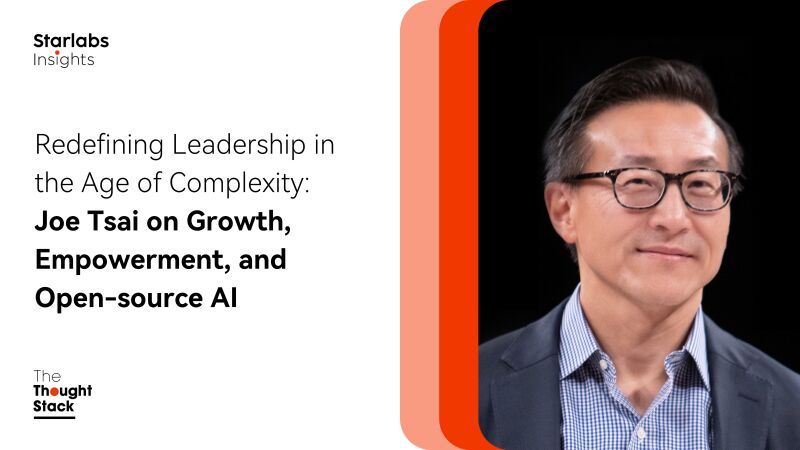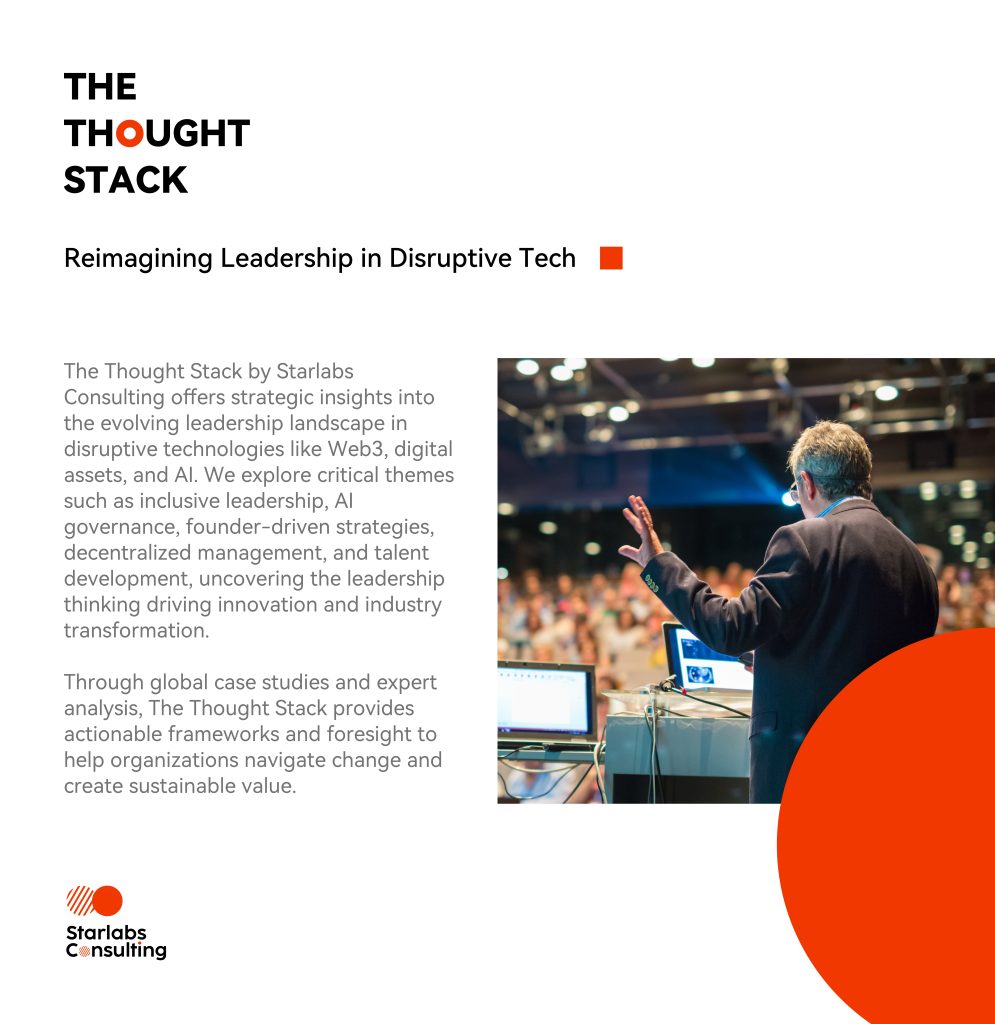
Redefining Leadership in the Age of Complexity: Joe Tsai on Growth, Empowerment, and Open-source AI | The Thought Stack
The Thought Stack is a flagship editorial series by Starlabs Consulting, dedicated to leadership research and insights in the realm of disruptive global technologies. Rooted in a global perspective and strategic consulting practice, the series aims to deliver forward-looking, actionable leadership frameworks that enable organizations to navigate transformation, drive sustainable growth, and create long-term value.
In this edition, we spotlight Joseph Tsai, Co-founder and current Chairman of Alibaba Group. We examine how he is guiding the company through a critical phase of transition—reviving a growth-oriented mindset, empowering a new generation of leaders, and championing a vision for open-source AI ecosystems. Through his strategic choices and value convictions, we aim to distill a future-oriented leadership model: how to redefine core purpose and leadership logic amid rising organizational complexity and accelerating technological paradigm shifts.Born in Taipei in January 1964 and educated in the U.S. and Canada, Joseph “Joe” Chung-Hsin Tsai holds degrees in economics and law from Yale. In 1999, he made a bold move—leaving a $700,000-a-year private equity job to join Alibaba, then an obscure startup in Hangzhou that hadn’t even been incorporated before his arrival.

As the only Western-educated co-founder, Tsai played a pivotal role in shaping Alibaba’s foundations, serving as CFO and Executive Vice Chairman. He was instrumental in establishing the company’s financial and legal frameworks, and was the driving force behind Alipay—now a cornerstone of trust-based digital commerce. His efforts also laid the groundwork for Alibaba’s eventual expansion into global markets.
Now serving as Chairman, Tsai is entering a new chapter in his legendary journey at Alibaba. While his early-stage vision for e-commerce remains a source of inspiration, this new piece of the Thought Stack will explore a different side of his legacy: Tsai’s philosophy on leadership, empowerment, and the building of open-source ecosystems in the post-platform era.
Back to the Startup Mindset with a Simpler Vision
As Alibaba gets ready for its third decade, the reigning champion of Chinese e-commerce faces mounting challenges. In many of his public remarks, Tsai has not shied away from acknowledging the organizational issues, growing competition, and regulatory scrutiny that have been crippling the company for years.
In his view, a common problem with large companies is that they become set in their structure — trying to fit business direction into existing frameworks, when in fact it should be the other way around: define the direction first, then design the structure and find the right people.
“If you look at the history of Alibaba, all of our high growth businesses were developed organically.”
One of Alibaba’s greatest strengths, according to Tsai, lies in its capabilities to push for “organic innovations”. Although Alibaba was not known for successful acquisitions, the leadership consistently addressed urgent problems with internal solutions that became part of a cohesive ecosystem.

Joseph Tsai and Jeffrey Katzenberg discuss the culture of survival and innovation at the World Governments Summit 2025
For instance, when eBay rapidly expanded into the Chinese market in the early 2000s, Alibaba responded with Taobao — a consumer-facing B2C platform that marked a major pivot from its original B2B model. And when online payments were riddled with fraud risks, Alipay was developed to build trust between buyers and sellers.
In a similar vein, as monetization became a major issue for Taobao, a search-based advertising system was created and became the primary revenue engine for the company. Later, when cloud computing costs surged, Alibaba invested heavily in developing its own cloud infrastructure, a move that paid off in the long run.From these examples, Tsai’s definition of “organic growth” becomes clear: Alibaba is a problem-solving company, built around a mission to “make it easy to do business anywhere.” The company’s recent struggles, he suggests, stem from losing sight of that mission — particularly forgetting “who our real customers are” and failing to offer them the best possible experience.

The Alibaba Ecosystem
Now, under new CEO Eddie Wu and Tsai as Chairman (formerly Executive Vice Chairman), Alibaba is undergoing a major reorganization with a user-focused, value-driven strategy. The original six business units have been consolidated into two core engines: e-commerce and cloud computing.
As Tsai puts it, e-commerce is the most competitive industry in the world, with no real barriers to entry. In such an environment, companies can’t rely solely on cost-cutting. What’s needed is a growth mindset most often seen in startups: that is, a clear mission, a specific problem to solve, and the discipline to stay focused. Without that clarity, it’s easy for large companies to get distracted and lose the values they were built on.
Let Young People Make Decisions — and Mistakes
Empowerment — especially of young people — is a recurring theme in Tsai’s leadership philosophy. When he was appointed chair of Alibaba during the latest management transition, he declined the title of executive chairman, insisting that a company should have only one decision-maker at the top. Anything else would create confusion for employees and partners alike.

Alibaba Former Chairman and CEO Daniel Zhang (left), Chairman Joseph Tsai (center), and CEO Eddie Wu
As chair, Tsai defines his role as supportive: offering informed opinions on key issues like resource allocation and incentive structures, but not interfering in daily operations.
“True leaders are humble people. They have the humility to hire people smarter than they are.”
“It’s important that as chairman, you don’t get in people’s way. A lot of chairmen can’t let go,” Tsai said during a conversation with Jeffrey Katzenberg at the World Governments Summit 2025. “I don’t think that’s the right way to develop the next generation of leadership.”
“Empowerment means letting them make decisions and letting them make mistakes, and training them so that they can recover from mistakes.”
At a certain point, the company will outgrow any one leader’s capabilities — and that’s where empowerment becomes crucial. According to Tsai, long-term sustainability comes from putting trust in younger leaders, especially those on the front lines with customers and users.
Tsai On AI: The Real Power Lies in Open Source
While many focus on AI’s risks to jobs, education, and industry, Tsai remains consistently optimistic about the AI-driven business landscape. Reflecting on Alibaba’s recently released AI reasoning model, Qwen, Tsai sees the technology as a way to break free from a mindset dominated by static knowledge acquisition.
In his interview with CNBC’s David Faber, he points out that the definition of smart AI may not be as instinctive as we thought—just as people from different backgrounds naturally hold varying perspectives on the same issue, perceptions of AI will also differ across genders, communities, and industries—many of which have yet to be fully understood or appreciated.

Joe Tsai at the Converge Live event in Singapore
According to Tsai, the significance of the “deep-seek moment” lies not in proving whether China or the U.S. has superior AI capabilities, but in highlighting the power of open source—a gem of human ingenuity that fosters broader development and enables a proliferation of applications built on top of existing models.
In the same vein as his argument that cost-cutting is not a sustainable path to outperform competitors, Tsai contends that AI should not be treated as an existential threat to be overcome. Rather, it represents a pivotal paradigm shift—one that underscores the importance of openness and collaboration for businesses, individuals, and governments alike.
Survival, Vision, and the Long Game
As Joe Tsai recalls what Jack Ma used to tell Alibaba’s co-founders: “As long as you survive one more day, something good may happen.” The idea is simple, but in uncertain times—whether due to geopolitical shifts or AI disruption—it can be a powerful message that sustains a company through its most difficult moments.
While Alibaba may have long passed its critical survival juncture, its veteran leadership reminds us that even the most forward-thinking companies are not immune to the pitfalls of maturity. As Simon Sinek argues in Start with Why, most organizations communicate from the outside in—focusing on what they do, how they do it, and only then why they do it. But truly visionary leaders reverse this order, placing purpose at the center of everything.
Alibaba’s reorganization may be a long and winding road, but with clear-eyed leaders like Tsai at the helm, the e-commerce giant appears poised not only to grow larger and remain adaptable, but also to continue empowering the next generation—without ever losing sight of its “why.”

Works Cited
World Government Summit. (2024, February 12). A conversation with Joseph Tsai – WGS 2024 [Video]. YouTube. https://www.youtube.com/watch?v=Sx6YHgrPSFQ
Stanford eCorner. (2017, October 18). Joe Tsai: The evolution of Alibaba [Video]. YouTube. https://www.youtube.com/watch?v=-kppZy6Ahu8
CNBC International Live. (2023, November 17). Alibaba’s Joe Tsai on China’s AI ambitions and the future of commerce [Video]. YouTube. https://www.youtube.com/watch?v=iWGZNo-_f5A
T.J. Parker. (2021, March 5). Joe Tsai on entrepreneurship and resilience [Video]. YouTube. https://www.youtube.com/watch?v=vj9jE05oOA0
Goldman Sachs. (2022, September 12). Talks at GS: Joe Tsai on investing, ownership, and global outlooks [Video]. YouTube. https://www.youtube.com/watch?v=nPhlyxeXEBs
Norges Bank Investment Management. (2023, June 21). Joe Tsai on long-term thinking and global markets [Video]. YouTube. https://www.youtube.com/watch?v=mT6mRJehJdw
Crain’s New York Business. (2025). Who is Joe Tsai? Brooklyn Nets owner and new Alibaba chairman. https://www.crainsnewyork.com/technology/who-joe-tsai-brooklyn-nets-owner-and-new-alibaba-chairman
Harne, A. (2021, November 15). What is Alibaba Ecosystem | Alibaba Ecosystem Explained. ImageTranslate. https://imagetranslate.com/blog/what-is-alibaba-ecosystem-alibaba-ecosystem-explained/Caixin Global China Watch. (2023, June 21). Alibaba boss Daniel Zhang to step down with co-founders to take the reins. Caixin Global China Watch. Retrieved from https://caixinchinawatch.substack.com/p/alibaba-boss-daniel-zhang-to-step





